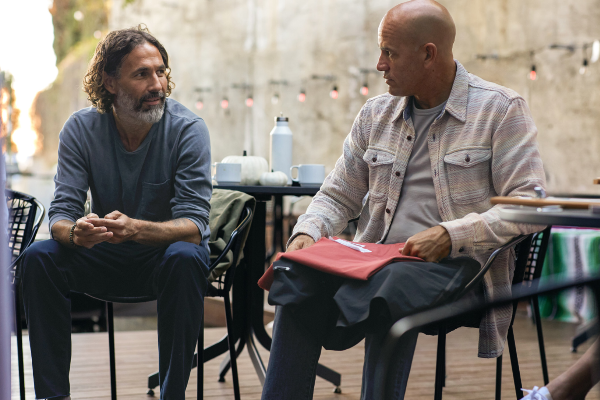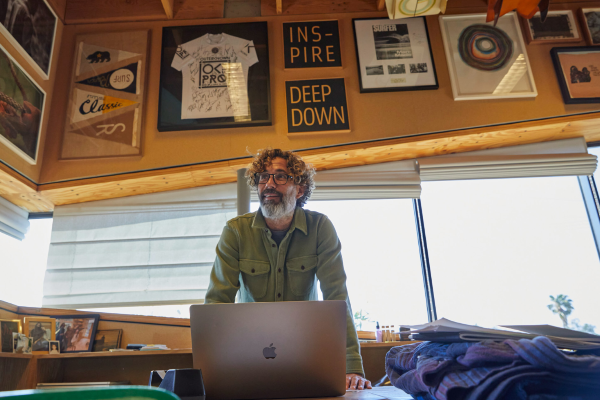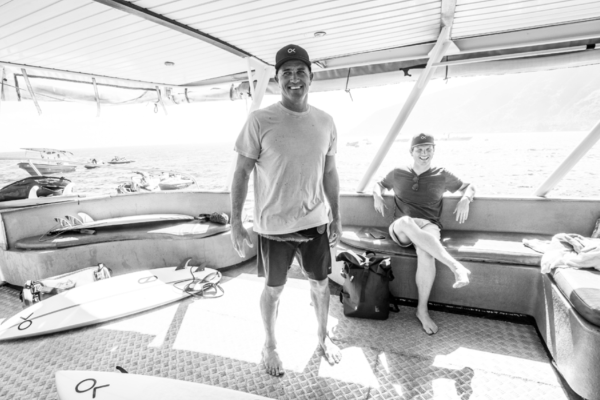BY SHELBY TUTTLE
As an 11-time World Surf League (WSL) Champion, Kelly Slater is widely considered the greatest surfer of all time. In his illustrious 34-year career, Slater has traveled to some of the world’s most scenic and remote locations to surf waves that few dare dream of. From the thick, deadly waves of Hawaii’s Pipeline and the glassy, heavy barrels of Tahiti’s Teahupo’o, to the fast, left-breaking peel of Fiji’s Cloudbreak, the waves Slater has surfed each offer their own beautiful complexity, naturally shaped by their environment. Among them, however, Slater has noticed one disheartening commonality.
In a 2019 podcast interview on The Sea Has Many Voices, Slater said, “When I used to go to France in the late 80s, early 90s, there was so much plastic in the water. There were so many plastic bags and so much crap in the water. I remember at one point surfing and thought if I fall and I get a mouth full of water, I might choke on a plastic bag.”
He notes that the pollution in that particular region has gotten better over time, but areas like Central America and Japan remain among the worst regions for ocean pollution that he’s witnessed during his time as a professional surfer. It’s easy to see that Slater’s connection with the ocean is profound, and that the challenges facing our environment weigh on his psyche.
A SURFER’S AWAKENING
Increasingly throughout his career, Slater began to contemplate the ecological impact of his sport. A lifetime spent in the ocean had cultivated a deep respect for the planet. In his growing environmental consciousness, he began to question the boards that he rode and clothes that he wore, working to gain a deeper understanding of a typical supply chain and the consequences — both human and environmental— associated with it.
He tells me, “As a lifelong surfer, I’ve seen how much pollution humans have made around the world and have come to understand how negatively impacting clothing and especially fast fashion — and space labor — have been on our world. And so, challenging the norms of the industry to show that there is a better way to make clothes was a critical issue for me personally.”
For 23 years, Slater was sponsored by surf clothing giant Quicksilver — a partnership that was as synonymous in the world of surfing as Tiger Woods was to Nike in golf. In April 2014, Slater ended his relationship with the brand, effectively terminating one of the longest-standing sponsorships in the sport.
In a letter to fans on his Facebook page, Slater said, “For years I’ve dreamt of developing a brand that combines my love of clean living, responsibility and style. The inspiration for this brand comes from the people and cultures I encounter in my constant global travels and this is my opportunity to build something the way I have always wanted to.”
He used the opportunity to announce a new partnership with The Kering Group (owner of luxury brands like Gucci, Saint Laurent, and Balenciaga), which would help him launch his now successful clothing brand, Outerknown. But The Kering Group was just a small piece of the puzzle. Slater tapped fashion industry veteran and creative designer John Moore as his co-founder, whose shared love for the ocean and passion for sustainability made him Slater’s perfect partner.
A seasoned creative with a penchant for innovation, Moore has been shaping the fashion industry for over two decades. Recognized as one of GQ’s Menswear Designers of the Year in 2014, his resume includes building iconic brands like Hollister for Abercrombie & Fitch and being selected as a Fellow for the first Levi Strauss & Co. “Collaboratory” in 2016, where he was invited to collaborate with other like-minded industry executives on environmental solutions for their organizations.

BREAKING THE MOLD
As Outerknown’s creative visionary, Moore drives design and storytelling, while leading his team to investigate sustainable practices and fabric innovations that make Outerknown a pioneer in its field.
“It’s been more than a decade since we committed to building Outerknown differently. Over this time, we’ve seen the sustainable conversation increase and messaging around responsible innovation show up across marketing industry-wide,” Moore said. “That’s positive, but there’s a big difference between talking, marketing, and actually doing the work.”
Slater notes that Outerknown’s collaborations with like-minded partners is crucial, and that when creating their products, they look for people and companies who are breaking new ground.
“When you have an idea, you have to start somewhere. And although it might not be perfect, you start to find the right partners and people and ideas through the experience to streamline the process.” He continues, “I’m proud that every step of our process meets the standards and ideals we founded the company on.”
Those ideals, of course, include the company’s mantra of taking care of both people and the planet. Outerknown was the first brand to be certified by the Fair Labor Association before ever creating a single product.
“Every decision we make — from selecting suppliers to building new products — keeps workers’ rights and safety top of mind,” Slater says.
A key component to upholding the company’s mantra involves the materials sourced to construct its products. Recycled wool, cotton, and polyesters are used across Outerknown’s collections and Moore notes that natural materials take precedence whenever possible. When synthetics are necessary for items like performance board shorts, the team works diligently to source recycled materials.

Moore shares, “A few years ago, we offered the world’s first Merino wool boardshort. It was a great idea, and I loved it, but it didn’t sell well because it lacked many of the performance factors necessary for movement and durability.”
Moore also says that Outerknown’s preferred fiber (organic, recycled, or regenerated) usage improved from 95% in 2022 to 99% in 2024, and that the company works hard to avoid the use of fibers like virgin polyester, virgin elastane, and virgin cotton. The company’s internal fiber policy and scorecard guide the considerations for preferred fibers based on sustainability and circularity potential. At Outerknown, organic cotton, recycled cotton, Regenerative Organic Certified® cotton, hemp, and responsible and recycled wool reign supreme. Notably, the company has outlined a plan to achieve full circularity by 2030.
Of the upcoming Outerknown fall and winter collection, Moore says he is most excited about their line of sweaters made in Italy and Romania which use wool that has been sorted by color and broken down by hand, so that new recycled wool yarns can be spun in the same colors without using harmful dyes or chemicals. This process also helps to divert pre- and post-consumer virgin wool textiles from landfills by putting this valuable fiber back into circulation.
“There’s also a bio-fiber blend that we’re sourcing from the ocean and putting into one of our most important products for later this fall,” Moore notes. “Being surfers, this innovation hits squarely at home since it comes from the ocean. I can’t talk about it yet, but we’ll be the first to market with this, so [I’m] very proud of the team’s effort to bring this to life.” Slater notes that he is excited to be working toward creating high-quality, responsibly made pieces that are also affordable.
BALANCING SUSTAINABILITY WITH AFFORDABILITY
He and Moore aren’t shy about addressing Outerknown’s price point (the brand’s signature Blanket Shirt is priced at $168), which is considerably higher than most surf brands — but then again, Outerknown isn’t really a surf brand. As I lazily thumbed through various racks of Blanket Shirts neatly hung on sustainable hangers at Outerknown’s store in Malibu, it was easy to see that Outerknown is a lifestyle brand all its own. Without a doubt, Slater’s fame naturally garners an affinity for his brand within the surfing community, but overall, Moore notes that Outerknown’s customers are those who want to purchase clothing that aligns with their values.
“They are willing to pay the additional cost associated because they see it as a long-term investment,” Moore says. “For the industry to truly catch up, this cost of buying responsibly needs to continue to come down. A cultural shift in consumption is necessary so that more businesses view sustainability as a business opportunity.”
To address the high environmental costs of consumption, the team at Outerknown has also created Outerworn, a pre-owned marketplace hosted on Outerknown’s website, where fans of the clothing can purchase and sell pre-loved Outerknown items. And when it comes to helping other brands recognize the benefit of sustainability in business, Slater and Moore aren’t selfish or secretive about Outerknown’s sustainability processes and want other companies to benefit from their research.
“Even though it takes time and discipline to build a responsible supply chain that takes care of its workers, we know that this model causes the least harm,” Slater says. “[We] have made our processes transparent so that other companies can use Outerknown as a resource and an inspiration.”
Moore echoes his sentiment. “If Outerknown, as an emerging brand with no prior experience, can do it — this should be a model for the industry that businesses big and small can do it, as well.”

AN UNTAPPED MARKET
Outerknown has often voiced its desire to better reach the surf crowd with price points that can more closely compete with traditional surf brands. When Outerknown first launched, the brand was carried on high-end websites, most likely due to its launch with The Kering Group. But as the brand has expanded into nine brick-and-mortar locations across the country — many in popular surf spots — it’s a clear opportunity for Outerknown to capitalize on a would-be built-in demographic, if not for what some may view as a price barrier.
Newly minted CEO of Outerknown Dylan Slater (no relation to Kelly) confirms, “We are working on a product line in collaboration with Kelly for a to-be-announced future season. We are excited to bring a fresh approach to product(s) within the surf market, which will be delivered at a price point tailored to the surf specialty retail channel.”
A TRIPLE THREAT: SLATER’S BUSINESS EMPIRE
In May, Dylan Slater was named CEO of the new holding company that unites Outerknown, Firewire Surfboards, and Slater Designs under one roof. Kelly Slater became the majority stakeholder of Firewire Surfboards in 2015, where he is also able to showcase his own line of surfboards made in collaboration with some of the world’s best shapers at Slater Designs. Prior to the purchase of Firewire, Kelly parted ways with longtime board sponsor Channel Designs, citing overall concerns about how surfboards were made and the environmental legacy they left behind.
Of the boards made at Firewire, Dylan Slater shares, “Our surfboards are constructed using bio-resin, which produces a reduced carbon output by 30%.” He continues, “We are constantly looking for new materials to use that make them stronger and last longer.”
He notes that the environmental synergies and philosophies of all three companies allow them to draw on research, materials, and experience to build the best products in the most responsible way.
SLATER’S LEGACY BEYOND THE SURF
At the time of writing, Slater is currently in Fiji as a wildcard entry for the last stop of the WSL’s regular season. As he missed the mid-year cut for the second half of 2024, the event is speculated to be Slater’s last hoorah — the perfect way for him to go out with a bang, in his favorite surfing destination of all time. At 52, Slater has won the Fiji Pro four times. Of his 11 world titles, he also holds the record for being both the youngest and oldest professional surfer to win a world surfing championship at ages 20 and 39. He has competed in a reported 280 World Tour events and claimed 56 Championship Tour wins.
As the competition opens, onlookers wait with bated breath to witness surfing’s G.O.A.T. in the most fitting of potential finales. But certainly, Slater will not simply fade into the sunset. He is a force to be reckoned with, not just in the world of surfing, but also in business and certainly, environmental stewardship. He’s made caring about the environment cool, and thus, raised the bar not only for consumers, but the fashion industry as a whole. As with surfing, Slater seems poised to leave a lasting legacy in his next chapter of life, as well.
“I wanted to have Outerknown reflect and implement my beliefs and use it as a means to communicate deeper values,” he says. “I think that every small improvement we make has a big impact — for people and the planet.” For more, visit www.outerknown.com.






